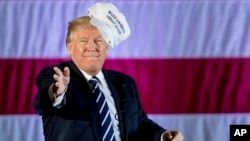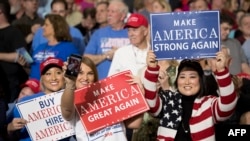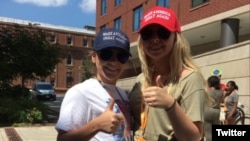Americans Are Delusional if They Think Trump Is Making America Great Again
Daryl Davis, a black musician who has made a exercise of befriending members of the Ku Klux Klan, says he knows exactly what racists hear in the slogan "Make America Cracking Again."
Donald Trump "won the election on ane discussion, one give-and-take only. And that discussion was 'again,' " Davis says.
"When was 'again?' " Davis asked during an interview at his home in May, discussing race relations in the age of President Trump. "Was it back when I was drinking from a carve up water fountain? Was it when I couldn't eat in that restaurant over there? ... Make America Slap-up Again -- before I had equality?"
Trump told The Washington Post he idea of the slogan in 2012 and trademarked it immediately, although similar words have been used past politicians equally far back every bit President Ronald Reagan.
President Bill Clinton is on record equally having used information technology during his presidential campaign in 1991, although non every bit an official slogan. Yet, in 2008, while campaigning for his wife, he noted: "If you're a white Southerner, you know exactly what it means, don't you?"
Is information technology possible that Trump was elected to the presidency with a racially charged slogan? Or are supporters and critics simply hearing what they want to hear?
Christian Picciolini, a quondam neo-Nazi who now works to help other white supremacists exit the motility, says the slogan fits into the alt-right's efforts to make its message more than attractive by toning down the rhetoric.
"That was a concerted effort," Picciolini says in an informational video for Vox news. "We knew nosotros were turning more people away that we could eventually take on our side if we just softened the message. These days with our political climate we come across a lot of coded linguistic communication, or dog whistles." (Picciolini'southward use of "dog whistle" refers to a subtle bulletin meant to be understood only past a item group of people, similar a whistle pitched high enough that a dog might hear it, simply a homo would not.)
"Make America Swell Again?" Picciolini asks rhetorically. "Well, to them, that means make America white once more."
In June 2016, a Tennessee politician even put that on a billboard. Rick Tyler, running for a congressional seat in mostly white Polk Canton, Tennessee, explained that his "Make America White Again" billboard was meant to evoke the mood of 1950s America, when television shows arcadian the image of the happy white family unit.
In a Facebook post, Tyler said, "It was an America where doors were left unlocked, tearing crime was a mere fraction of today's charge per unit of occurrence, in that location were no car jackings, dwelling invasions, Islamic Mosques or radical Jihadist sleeper cells."
Tyler's billboard speedily drew negative national attention and was taken downward within a few days.
Better economic times
President Trump says he merely meant the slogan to refer to ameliorate economic times.
"I felt that jobs were pain," Trump told the Mail service in January. "I looked at the many types of illness our state had, and whether it's at the border, whether it'due south security, whether it'due south law and order or lack of police force and guild."
Trump said the slogan "inspired me, considering to me, information technology meant jobs. Information technology meant industry. And it meant military strength. Information technology meant taking care of our veterans. It meant and so much."
David Axelrod, master political strategist for onetime president Barack Obama, credits Trump with understanding his audition and crafting a bulletin whose flexibility was part of its entreatment.
Trump, Axelrod told the Post, "understood the market that he was trying to reach. You can't deny him that." He added, "In terms of galvanizing the market that he was talking to, he did information technology single-mindedly and ingeniously."
Then who is Trump'due south market place? According to surveys, at its cadre are white men in the blue-collar sector -- the demographic with the most to lose when women and minorities started gaining more rights and earning ability over the past few decades. But people who find promise in "Make America Great Again" come from more than than just that narrow category.
Jason Rankin, a real estate agent in Knoxville, Tennessee, described his thoughts about the slogan this way: "Making America Neat Once more to me means at least the following things: less national debt, more secure borders, more freedom of speech, more than gun rights, more than chore opportunities across the state (simply especially in rural areas), higher GDP, stronger national security & a stronger military machine, more coin in every American's banking concern business relationship."
Tony Goicochea, an audio engineer in Washington, D.C., said Make America Smashing Again "has a vision to it," besides as a reference that, to him, speaks of greater economic prosperity in the by, and financial lives unburdened by crippling debt.
Growing up in the 1980s, Goicochea said, "I saw people get to college, they graduated, and they got a job. That was it. They were able to move out on their own and start a life for themselves. So I retrieve about our economic science, how much better our economics were."
At present, Goicochea noted, American families are experiencing a boomerang syndrome -- recent graduates who have moved back in with their parents because they cannot make enough money to back up themselves and pay off college debt.
Shannon Crannick, a retail consultant in Festus, Missouri, says she believes making America dandy again means "putting an stop to all the hate that has come around in the last few years. Making it safe to walk down the street again. Less debt, secure borders, more back up for the armed forces, freedom of speech coming back, better help for the poor and people loving each other over again."
Amend for whom?
In a Washington Post/ABC News poll taken in September 2016, iii-quarters of self-identified Trump supporters said America's greatest days are in the past.
When the aforementioned question was asked of other demographic groups, however, five out of six African-Americans disagreed.
The polltakers ended that ane'south estimation of the country's greatness depends on factors such as gender, race and didactics level -- the kinds of factors that have a direct impact on income and political representation.
Hence, "Make America Great Again," doesn't merely entreatment to people who hear it as racist coded language, only also those who have felt a loss of status as other groups accept become more empowered.
Marketing consultant Eva Van Burden, a critic of the president, says the malleability of the words "swell" and "again" are a common marketing trick: using words that audio positive, just lack specific meaning.
"By leaving a definitional vacuum around the word 'swell,' information technology became very easy for groups to co-opt it, ascribing to information technology the meaning they wanted it to accept," Van Brunt says. "The same way a mother rests easy because her baby's nutrient has 'all-natural' written on the jar, Nazis, the KKK, and other white supremacists were able to feel proficient about Trump because 'peachy' became interchangeable with white, heterosexual, male, hate, oppress, comport.
Equally for the word "again," VanBrunt notes that information technology limits the audience to those who think America was once great and no longer is.
"That excludes those who never thought America was great for them and those who recall America is great for them now," she says. "Looked at from that vantage point, information technology'southward hard to imagine that the co-opting by sure groups was accidental."
Different interpretations
For better or worse, the phrase is a loaded one, with potential to cause problem between people who do not share the same interpretation.
On August 19 at Howard University in Washington, D.C., 2 white teenage girls on a summer enrichment trip entered a campus deli while wearing "Brand America Smashing Again" trucker hats that they had recently bought at a suburban mall.
The girls, part of a grouping of students from Union City High School in Pennsylvania, say they were unaware Howard was an historically blackness university.
"I don't fifty-fifty recollect our advisers really knew," xvi-year-old Allie Vandee, one of the hat-wearers, told Buzzfeed. "Nosotros simply thought of Howard Academy, we know it'south celebrated, and then we kinda went," she said.
Howard University students who witnessed the event say students chastised the teenage visitors for wearing the slogan. One walked upward and snatched at their hats. Another one cursed at them. The teenage girls left the cafeteria and shared their experience on Twitter. They say they were unfairly harassed.
The incident prompted discussions online and on campus at Howard. Information technology has resulted in no major protests, turf wars or Twitter feuds. But it was an indicator of securely different interpretations of that particular four-give-and-take phrase.
Student Merdie Nzanga, a junior at Howard, was in the cafeteria when the teenagers walked in. She said several of her friends confronted the teenagers for being insensitive.
"I didn't say anything," she told Buzzfeed. Just, "to myself, I thought, 'This is going to exist trouble.'"
Source: https://www.voanews.com/a/is-make-america-great-racist/4009714.html




Belum ada Komentar untuk "Americans Are Delusional if They Think Trump Is Making America Great Again"
Posting Komentar